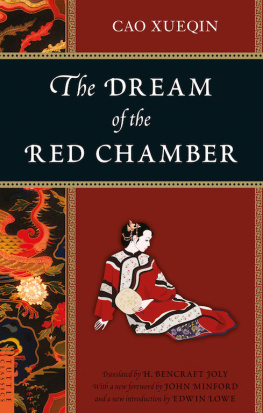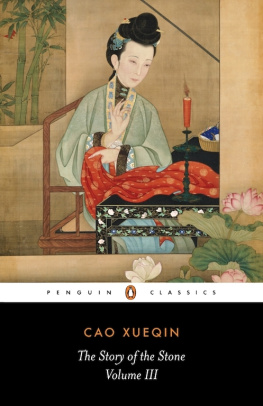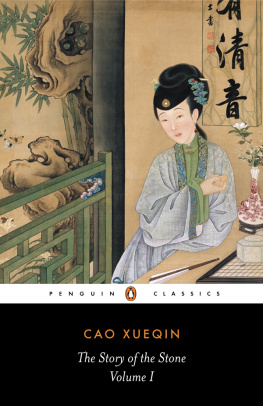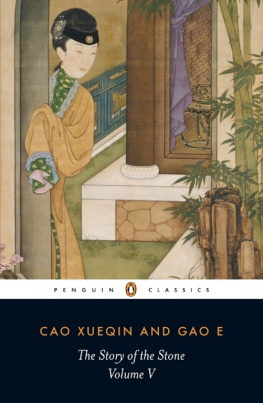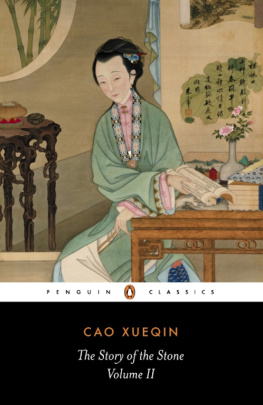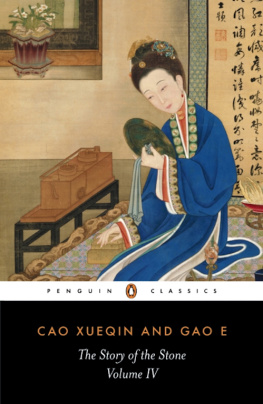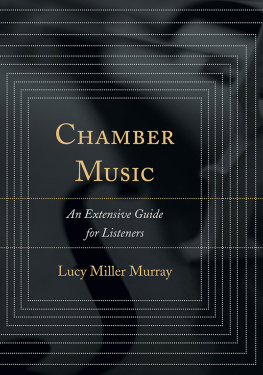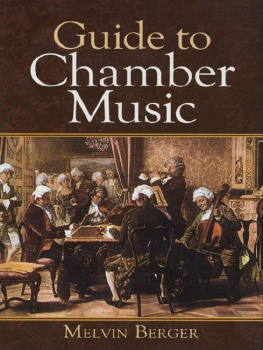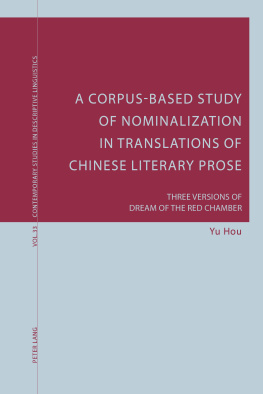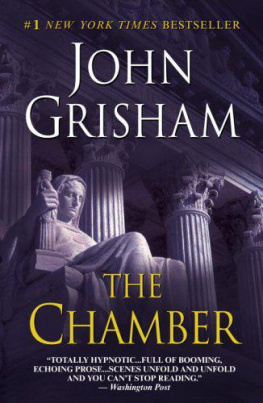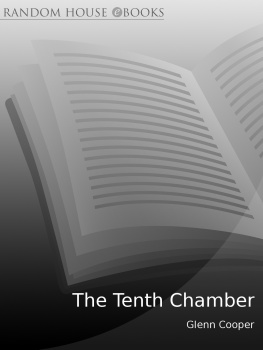Cao Xueqin - The Dream of the Red Chamber
Here you can read online Cao Xueqin - The Dream of the Red Chamber full text of the book (entire story) in english for free. Download pdf and epub, get meaning, cover and reviews about this ebook. publisher: Tuttle Publishing, genre: Detective and thriller. Description of the work, (preface) as well as reviews are available. Best literature library LitArk.com created for fans of good reading and offers a wide selection of genres:
Romance novel
Science fiction
Adventure
Detective
Science
History
Home and family
Prose
Art
Politics
Computer
Non-fiction
Religion
Business
Children
Humor
Choose a favorite category and find really read worthwhile books. Enjoy immersion in the world of imagination, feel the emotions of the characters or learn something new for yourself, make an fascinating discovery.
- Book:The Dream of the Red Chamber
- Author:
- Publisher:Tuttle Publishing
- Genre:
- Rating:4 / 5
- Favourites:Add to favourites
- Your mark:
- 80
- 1
- 2
- 3
- 4
- 5
The Dream of the Red Chamber: summary, description and annotation
We offer to read an annotation, description, summary or preface (depends on what the author of the book "The Dream of the Red Chamber" wrote himself). If you haven't found the necessary information about the book — write in the comments, we will try to find it.
The Dream of the Red Chamber — read online for free the complete book (whole text) full work
Below is the text of the book, divided by pages. System saving the place of the last page read, allows you to conveniently read the book "The Dream of the Red Chamber" online for free, without having to search again every time where you left off. Put a bookmark, and you can go to the page where you finished reading at any time.
Font size:
Interval:
Bookmark:
The DREAM
of the
RED CHAMBER
The DREAM
of the
RED CHAMBER
Written by Cao Xueqin
Translated by H. Bencraft Joly
With a New Foreword by John Minford
and a New Introduction by Edwin Lowe
TUTTLE PUBLISHING
Tokyo Rutland, Vermont Singapore
Published by Tuttle Publishing, an imprint of Periplus Editions (HK) Ltd., with editorial offices at 364 Innovation Drive, North Clarendon, Vermont 05759 U.S.A. and at 61 Tai Seng Avenue #02-12, Singapore 534167.
Copyright 2010 Periplus Editions (HK) Ltd.
All rights reserved. No part of this publication may be reproduced or utilized in any form or by any means, electronic or mechanical, including photocopying, recording, or by any information storage and retrieval system, without prior written permission from the publisher.
Library of Congress Cataloging-in-Publication Data
Cao, Xueqin, ca. 1717-1763.
[Hong lou meng. English] The dream of the red chamber / Cao Xueqin ; translated by H. Bencraft Joly ; with a foreword by John Minford and an introduction by Edwin Lowe. -- 1st ed. p. cm. ISBN 978-1-4629-0247-71. China--Social life and customs--18th century--Fiction. 2. Families--China--Fiction. 3. Women--China--Fiction. 4. Domestic fiction. I. Joly, H. Bencraft. II. Title.
PL2727.S2A26 2010 895.1348--dc22 2010005577ISBN 978-1-4629-0247-7
Distributed by
| North America, Latin America & Europe | Asia Pacific |
| Tuttle Publishing | Berkeley Books Pte. Ltd. |
| 364 Innovation Drive | 61 Tai Seng Avenue #02-12, |
| North Clarendon, VT 05759-9436 U.S.A. | Singapore 534167 Tel: (65) 6280-1330; |
| Tel: 1 (802) 773-8930; Fax: 1 (802) 773-6993 | Fax: (65) 6280-6290 inquiries@periplus.com.sg |
| info@tuttlepublishing.com | www.periplus.com |
| www.tuttlepublishing.com |
Japan
Tuttle Publishing
Yaekari Building, 3rd Floor
5-4-12 Osaki, Shinagawa-ku, Tokyo 141 0032
Tel: (81) 3 5437-0171; Fax: (81) 3 5437-0755
tuttle-sales@gol.com
14 13 12 11 10 10 9 8 7 6 5 4 3 2 1
Printed in Singapore
TUTTLE PUBLISHING is a registered trademark of Tuttle Publishing, a division of Periplus Editions (HK) Ltd.
Table of Contents
| xi | |
| xxiii | |
| xxv | |
| 1. | 1 |
| 2. | 21 |
| 3. | 36 |
| 4. | 58 |
| 5. | 73 |
| 6. | 96 |
| 7. | 113 |
| 8. | 129 |
| 9. | 144 |
| 10. | 158 |
| 11. | 170 |
| 12. | 183 |
| 13. | 195 |
| 14. | 209 |
| 15. | 223 |
| 16. | 236 |
| 17. | 254 |
| 18. | 279 |
| 19. | 299 |
| 20. | 320 |
| 21. | 332 |
| 22. | 347 |
| 23. | 366 |
| 24. | 381 |
| 25. | 399 |
| 26. | 416 |
| 27. | 433 |
| 28. | 448 |
| 29. | 473 |
| 30. | 493 |
| 31. | 506 |
| 32. | 522 |
| 33. | 535 |
| 34. | 547 |
| 35. | 564 |
| 36. | 582 |
| 37. | 598 |
| 38. | 621 |
| 39. | 640 |
| 40. | 655 |
| 41. | 678 |
| 42. | 693 |
| 43. | 710 |
| 44. | 727 |
| 45. | 743 |
| 46. | 761 |
| 47. | 781 |
| 48. | 797 |
| 49. | 813 |
| 50. | 829 |
| 51. | 851 |
| 52. | 869 |
| 53. | 887 |
| 54. | 907 |
| 55. | 927 |
| 56. | 946 |
Foreword
The Story of the Stone (Shitouji , ), otherwise known as A Dream of Red Mansions or The Dream of the Red Chamber ( Hongloumeng , ), is the greatest of all the traditional Chinese novels. Dream inherits the proud tradition of vernacular fiction that had grown out of the storytellers repertoire during the Ming dynasty (13681644) such wonderful blockbuster sagas as Water Margin ( Shuihuzhuan , ) and The Romance of the Three Kingdoms ( Sanguo yanyi , ), or the picaresque telling of the adventures of Monkey in Journey to the West ( Xiyouji , ), rich in allegory and fantasy. Above all it is descended from the late-Ming novel of manners Golden Lotus ( Jinpingmei , ), a Chinese Liaisons Dangereuses , in which dark and frequently comical human impulses, and elaborate sexual games, are played out against the vividly depicted daily life of a wealthy libertine. Dream builds on this grand story-telling tradition, but takes it in a wholly new direction. It transforms Chinese mainstream fiction for the first time into an eloquent and subtly crafted vehicle for introspective autobiography and psychological realism, for memory and selfreflection. At the same time it engages in a lyrical and riddling quest for meaning in human experience (the Tao), taking the reader on a witty excursion down the pathways of Zen enlightenment and holding up a searching mirror to the ambivalence of the worldlings reality and illusion. It is superbly written and enormously long, well over one million words from beginning to end, with a gallery of over three hundred unforgettable characters from all walks of life.
The novel was begun in the mid-18th century by Cao Xueqin ( , 1715?1763), the empoverished grandson of Cao Yin (, 1658 1712), wealthy favorite of the great second emperor of the Manchu dynasty (and contemporary of Louis XIV), Kangxi (, 16541723). The Cao family had known extraordinary wealth and privilege, belonging as they did to the elite inner circle of Bond-servants to the Imperial Household, attached to the Manchu Plain White Banner. This honorary Manchu family was later amalgamated into the ranks of the Chinese Banners, the organizational structure created for Han-Chinese families that had thrown in their lot with the invading Manchus. During the reign of Kangxis successor, Yongzheng (, reigned 17231736) the Cao family was disgraced and ruined, and Cao Xueqin himself lived most of his life in abject poverty in the rural outskirts of Peking, remembering and chronicling in fictional form the golden days of his youth, recreating his dream, describing in loving detail the aristocratic jeunesse dore that had surrounded his adolescence. He never lived to finish his great project. His incomplete Dream , which circulated for decades in hand-written and annotated copies, was later edited and brought to a conclusion by another Chinese Bannerman, Gao E (, ?17401815), who added to the eighty chapters left by Cao Xueqin an ending in forty chapters, most probably based on fragmentary manuscripts left behind by Cao. This 120-chapter novel was printed and published for the first time in early 1792, complete with a series of fine woodblock illustrations, and it was this version that quickly became the standard one. It was reprinted again and again, with a growing number of commentaries, and went on to become enormously popular and influential in upper-class 19th-century Chinese households. As the saying went, if you were unable to drop references to this particular novel into your daily conversation, you were simply a nobody. It was loved for its extraordinarily vivid characterization, for its heightened Bannerman sensibility, for its encyclopedic recreation of a great culture in its last heyday (the book is an entertaining and exhaustive novelistic handbook on Chinese poetry, painting, medicine, furniture, food, tea, garden design and much more), and for its brilliantly authentic use of the 18th-century Peking vernacular, interlarded and embellished with choice morsels of the literary language.
Next pageFont size:
Interval:
Bookmark:
Similar books «The Dream of the Red Chamber»
Look at similar books to The Dream of the Red Chamber. We have selected literature similar in name and meaning in the hope of providing readers with more options to find new, interesting, not yet read works.
Discussion, reviews of the book The Dream of the Red Chamber and just readers' own opinions. Leave your comments, write what you think about the work, its meaning or the main characters. Specify what exactly you liked and what you didn't like, and why you think so.

